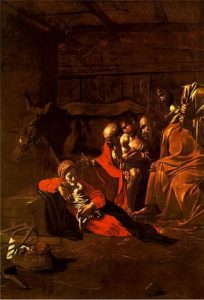Advent: Incarnational Leadership
The Word became flesh and made his dwelling among us. We have seen his glory, the glory of the one and only Son, who came from the Father, full of grace and truth.
John 1:14
Leadership isolates. Becoming a leader—any kind of leader—creates a distinction between us and those we lead. That’s true whether we are executives of Fortune 500 companies, directors in non-profits, project or team leaders in various organizations, or simply parents or grandparents. That distinction can often lead to a lack of honest communication. People start being more circumspect in what they say. After all, as leaders, we are in a position to affect—sometimes profoundly—their lives and their work. I remember becoming a leader for the first time, early in my career, and being surprised by how differently my colleagues talked with me. If we are not careful, we might easily live in a bubble of our and other’s making.

By Caravaggio – Adoration of the Shepherds, Public Domain.
Today’s text tells us, “The Word became flesh and made his dwelling among us.” Or as Eugene Peterson translates it in The Message: “The Word became flesh and blood, and moved into the neighborhood.” Among many other things, this means if we are to follow Jesus in our leadership, we are called to enter into the world of our followers. The further we go in our leadership, the more challenging that becomes. I had a conversation with a friend, who had reached one of the most senior executive roles in a Fortune 500 company. He was, in many ways, an exemplary Christian leader. Yet he told me how isolated he felt in his role. And, with considerable sadness, he acknowledged much of it was his own doing.
It takes intentionality and effort to “make our dwelling among” those we lead. Being present with our followers takes time and attention. In my leadership experience, I find myself mostly preoccupied with my organization’s direction, strategy, and goals, and focused on its progress and problems. The time I spend with my team is filled with agendas full of those kinds of issues and conversations. That’s both necessary and understandable. But it’s not sufficient. “Flesh and blood” leadership, the incarnational leadership that Jesus taught and embodied, requires something more. It means finding ways to live among—in other words, to enter the world of—those we lead.
It’s easy to see leadership as being mostly about setting expectations and holding people accountable. It’s simple to “lay down the law” as it were, about what we need from those who follow us. But it is quite another thing to embody “grace and truth” in “fulfilling the law,” to demonstrate what expectations and accountability looks like in reverse. In the end, expectations and accountability demand something not only of those who follow but of those who lead.
If shaping an institution’s character and culture is one of the prime responsibilities of leaders, then we must exemplify and embody our own expectations and accountability. And, as today’s text implies, embodiment includes a level of personal engagement that can only be described as sacrificial. “Grace and truth” are both costly. The Advent and Christmas seasons remind us how much so. As the Apostle Paul writes, reflecting on the Incarnation, “[Christ Jesus], being in very nature God, did not consider equality with God something to be used to his own advantage; rather, he made himself nothing by taking the very nature of a servant, being made in human likeness.” (Philippians 2:6-7)
QUESTIONS TO CONSIDER:
Do you have a sense of isolation as a leader? Why or why not? How has that changed as you developed as a leader and as your leadership responsibilities changed?
How have you learned to enter into the world of those who follow you? What has worked well for you? What has been problematic?
What can those who follow you expect from you? In what sense are you accountable to them? In what ways has your leadership involved sacrifice on your part?
CONTEMPLATION:
Take a few minutes to ponder the attached art: Adoration of the Shepherds by Caravaggio (1609).
PRAYER:
Lord Jesus Christ, I am astonished at your coming in Bethlehem’s stable. I marvel at your embrace of our humanity, particularly the depths of our poverty and the difficulties of childbirth under such conditions. It is easy to imagine the tiredness of Mary, the concern of Joseph, and the wonder of the shepherds at seeing you in such a humble state.
Forgive me for my slowness to enter the worlds of those I am called to lead. I confess I am easily enamored with position, power, and privilege. I find it difficult to relinquish these in order to serve those you have entrusted into my care. Help me to begin again, this Advent and Christmas season, to learn from you the grace and truth of becoming a lead servant.
I ask this in your name and for your sake. Amen.
Explore more at the Theology of Work Project online commentary:
In the Beginning was the Word (John 1:1-18)

Uli Chi
Board Member, Senior Fellow, Affiliate Professor
Dr. Uli Chi’s career is a testament to his unique approach to leadership. He has navigated the realms of for-profit businesses, nonprofit organizations, the theological academy, and the local church, gleaning a wealth of wisdom from each. As an award-winning technological entrepreneur, h...


